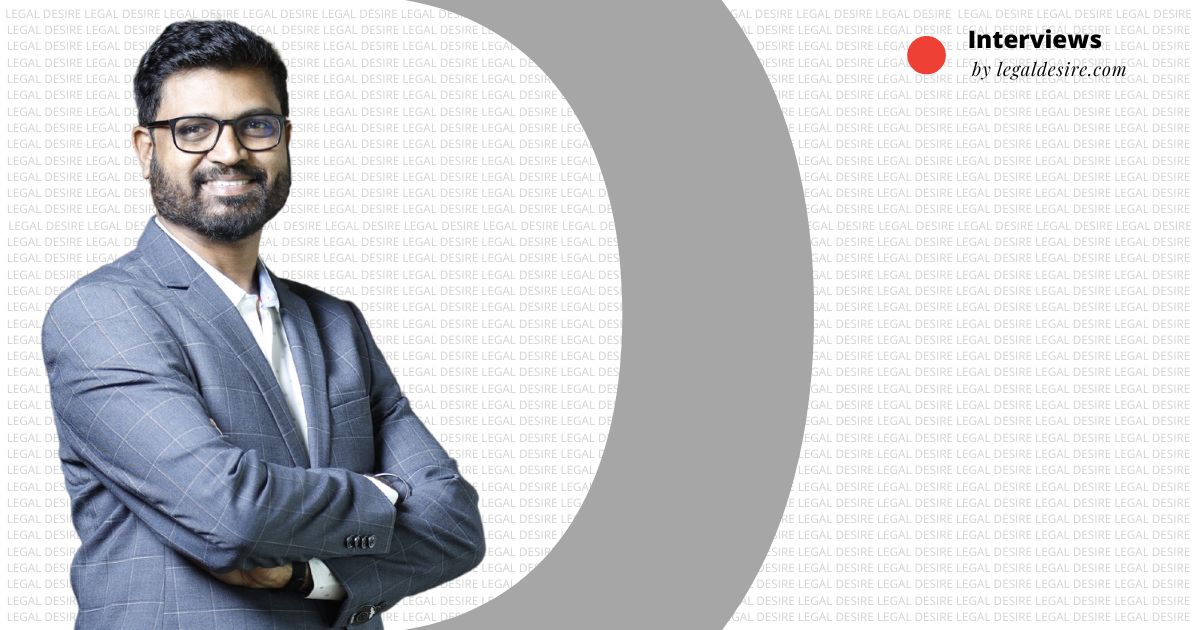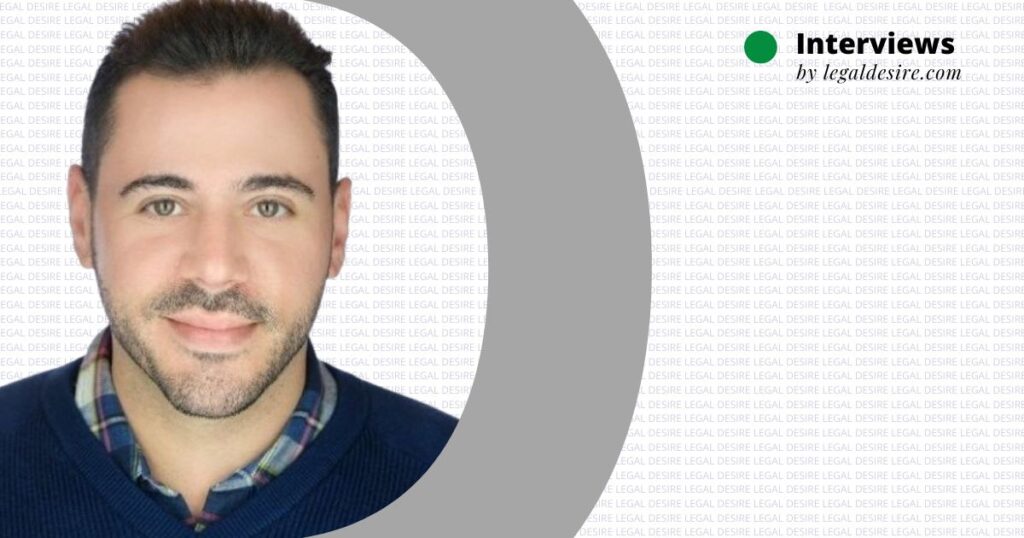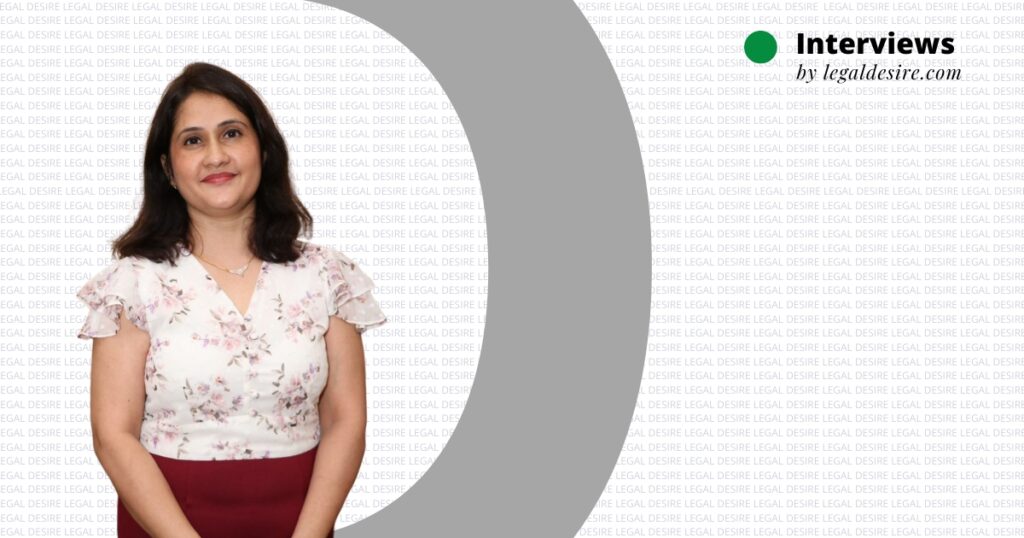Now Reading: In Conversation with Panduranga Acharya, General Counsel, Zepto
-
01
In Conversation with Panduranga Acharya, General Counsel, Zepto

In Conversation with Panduranga Acharya, General Counsel, Zepto
Panduranga Acharya currently, General Counsel at Zepto started his career as a litigating lawyer. Moving forward he decided to shift to corporate law and has worked with food aggregators like Swiggy and Zepto. The first gen lawyer, climbed the corporate ladder through hardwork and pure dedication. Acharya talked about the challenges faced by the food aggregators in India with Apoorva Mehta, Executive Manager at Legal Desire.
Question-Can you tell a little bit about yourself?
Greetings! As a first-generation lawyer, I have always been driven by a strong desire to make a positive impact on people’s lives. Throughout my career, I have been determined, fearless, and empathetic in my approach to problem-solving and team-building. I began my career as a litigating lawyer, and over time, I worked my way up the ladder to become a general counsel. During this journey, I have always strived to be sensitive to the needs of others and to build strong relationships with my clients and colleagues.
Question-You were a litigating lawyer, how was that experience?
I am grateful for the opportunities I had to start my career as a litigating lawyer, as they gave me a deep understanding of the practical nuances of legal jurisprudence. Through my experience as a practicing counsel, I had the chance to represent clients in a wide variety of commercial and personal disputes, which enabled me to sharpen my analytical and problem-solving skills. I found that my ability to read between the lines and identify key issues was particularly valuable in the context of complex legal disputes.
Overall, my experience in litigation taught me to approach legal issues with a critical eye and to develop creative strategies for achieving my clients’ goals. While my career has taken me in many different directions since then, I continue to draw on the lessons I learned as a litigating lawyer and remain committed to using my legal expertise to help others achieve their objectives.
Question- How did you decide to shift from litigation to corporate
During my career, I have had the opportunity to work in a variety of legal roles, each of which has offered its own unique set of challenges and rewards. One of the most impactful experiences I had was working for a Real Estate firm, where I gained a deeper understanding of the in-house counsel role.
I found that the in-house profile presented a different set of challenges than I had encountered as a litigator, but it was equally satisfying in its own way. The change was refreshing, and I was drawn to the dynamic nature of the in-house role.
Over the past decade, I have continued to work as an in-house counsel, and I have found that this role has much to offer in terms of professional growth and development. I am constantly challenged to think creatively and strategically to help my organization achieve its goals, and I have learned to balance legal considerations with practical business realities.
Overall, I am grateful for the diverse experiences I have had throughout my career, and I believe that each one has contributed to my growth and development as a legal professional.
Question-What kind of issues did you see in the telecommunications industry?
Telecommunication industry, like any other sector, has its own issues and I can think of environmental issues related to radio waves. This includes perceived concerns about the potential health effects of radiofrequency radiation emitted by cell towers and other telecommunications infrastructure. This would involve advising the Company on compliance with regulatory requirements related to these issues, as well as defending against legal challenges related to alleged health risks.
Another one is optical fiber cable laying, this includes negotiating easements and right-of-way agreements with property owners, obtaining necessary permits and approvals from local government bodies, and resolving disputes related to cable installation and maintenance. This would involve advising the Company on issues related to the protection of underground infrastructure and ensuring compliance with environmental and safety regulations during the installation process.
Question-What was your day to day role at FICCI?
I am proud to have had the opportunity to serve as co-chair of the working group for an online food aggregator for a year and a half. During this time, I was able to identify and address specific legal issues in the emerging market and work collaboratively with government agencies to advocate for effective policies that would improve the ease of doing business for the sector. As a lawyer, I believe it is important to be able to navigate complex legal and regulatory frameworks, and this experience allowed me to do so successfully while achieving positive outcomes for my Organization. It was an invaluable experience that has helped me grow both personally and professionally.
Question- Tell us about the legal challenges faced by companies like Swiggy and Zepto?
Food aggregators in India face various challenges related to their operations, including concerns related to food safety and quality, regulatory compliance, delivery logistics, and labor laws. These challenges are further compounded by the evolving nature of the food aggregator market and the increasing competition among players. The sector also faces environmental concerns related to the use of plastic packaging and the carbon footprint of food delivery. Overall, navigating these challenges requires a deep understanding of the legal and regulatory framework and a strategic approach to addressing emerging issues in the sector.
Additionally, distribution-related challenges for food aggregators in India include managing logistics and supply chain networks to ensure timely delivery of food orders to customers. This involves coordinating with restaurants and delivery partners (often gig workers) to ensure that orders are delivered efficiently and accurately. The use of gig workers presents its own set of challenges, such as ensuring compliance with labor laws and regulations and maintaining quality control over the delivery process. The drafting contract to ensure the entire eco-system is adequately covered and all the stakeholders are offered fair contractual terms requires a great detail and better understanding of business and hence is quite a tedious and challenging too.
Zepto is a hyperlocal on-demand delivery platform that offers revolutionary 10-minute delivery for a variety of products, including food, groceries and other essentials. Zepto is unlike a food aggregator dealing in restaurant services, and will have its own set of challenges, besides various challenges related to its operations, including concerns related to food safety and quality, regulatory compliance, delivery logistics, and labor laws.
Question-How does your typical day at work look like?
My day at work may involve a range of tasks such as reviewing high value contracts, providing legal advice to the management, participating in board meetings, team meetings, managing litigation and dispute resolution, overseeing regulatory compliance, and monitoring changes in laws and regulations that may affect the company’s operations.
In addition to these routine tasks, also involved in strategic decision-making and risk management. This may involve assessing potential legal risks associated with new business ventures or partnerships, negotiating complex transactions, and developing policies and procedures to ensure legal compliance across the organization.
Given the fast-paced business environment, it is expected to respond quickly to emerging legal issues or crises that may impact the organization. This could involve working closely with other executives, external legal counsel, and government regulators to find timely and effective solutions to these issues.
Question-What are fraud investigations and how are they taken care of?
Fraud prevention and investigation is a larger charter of the organization meant to set expectations on how one should behave generally and make decisions in a conflict of interest situation. A robust policy implementation and enforcement awareness is an important preventive measure and I spend more time on the strategic decisions to expect less number of issues.
Question-If not law, what would have been your career choice?
My path to law was not a straight line. When I was younger, I dreamed of becoming an entrepreneur, and I even started a small-scale business while studying. I would have been an entrepreneur.
Question-What advise would you give to the younger generation?
My advice to the younger generation aiming for success in the legal profession is to be as humble as a monk, as empathetic as a therapist, and as fearless as a superhero. Of course, there will be competition, but don’t let that stop you. Stay ahead of the game by keeping yourself updated and making lots of friends. And when it comes to making decisions, don’t be afraid to take the plunge. Remember, even the best lawyers make mistakes sometimes. The important thing is to learn from them and keep moving forward.










